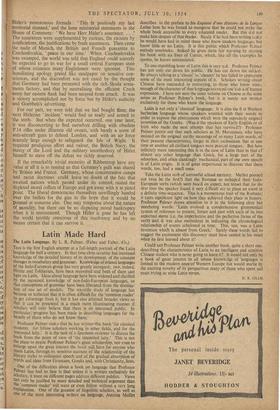Latin Made Hard
The Latin Language. By L. R. Palmer. (Faber and Faber. 45s.) THIS is the first English attempt at a full-length portrait of the Latin language for half a century. In that time close scrutiny has increased knowledge of the detailed history of its development, of the constant changes in vocabulary and grammar. Knowledge of related languages of the Indo-European group has very greatly increased; two, indeed, Hittite and Tokharian, have been recovered and both of them cast light on Latin. Ideas about language have been widened and clarified by the increased knowledge of non-Indo-European languages, so that conceptions of grammar have been liberated from the domina- tion of one set of models. The scientific study of language has become so technical that it is often difficult for the 'common reader' to get advantage from it, but it has also attained broader views so that it can be presented in a much more illuminating manner if scholars will only believe that there is an interested public. In particular, progress has been made in describing languages for the benefit of those who do not know them. describes in the preface to his Esquisse d'une Histoire de la Longue Latin how he was forced to recognise that he could not make the whole book accessible to every educated reader. But this d.d not make him despair of that reader. Surely if he had been writing today he would have had in mind those who know modern languages but know little or no Latin. It is this public which Professor Palmer entirely overlooks. Indeed he gives them fair warning by starting his book with six lines of Caesar, which, like all the examples he quotes, he leaves untranslated.
To one stumbling lover of Latin this is very sad. Professor Palmer has not only cut down his public. He has cut down his subject. By always talking as a 'classic' to 'classics' he has failed to appreciate some of the most interesting aspects of it. Scholars writing about Chinese have succeeded in conveying, to those who know none, enough of the character of that language to extend one's ids a of human expression. I have not seen the sister volume on Chinese in the same series as Professor Palmer's book, but it is surely not written exclusively for those who know the language.
Latin is not only a 'classical' language. It is also the fi. st Western barbarian language whose speakers wrestled with their words in order to express the abstractions which were the supremely original invention of the Greeks. (Was it the speakers of Early English or of Irish who made the next attempt that has survived?) Professor Palmer points out that such scholars as M. Marouzeau, who have insisted on the original eat thy meanings of so many Latin words, of their peasant characteristics, forget in their enthusiasm that at one time or another all civilised tongues were peasant tongues. But how infinitely more interesting this is in the case of Latin than in that cf almost any other language than Greek, for a large part of the odourless, and often clankingly mechanical, part of our own speech is of Latin origin. R is of great importance to discover that these words, too, had a smell once.
Take the Latin verb of sorrowful school memory. Meillet pointed out (was he the first?) that the Romans so reshaped their Indo- European verbs (which were bascd on aspect, not tense) that for the first time the speaker found it very difficult not to place an event in a definite time-sequence. This is a momentous trait of the Romans; it casts significant light on how they achieved their place in history. Professor Palmer draws attention to it in the following clear but unechoing words: 'Latin evolved a comprehensive grammatical system of reference to present, future and past with each of its two aspectual stems (i.e. the imperfective and the perfective forms of the verb) and it was also meticulous in indicating the chronological relationship of events echeloned in time. This, too, was a Latin invention which is absent from Greek.' Surely these words fail to suggest the excitement this discovery must have caused in his mind when he first learned about it!
Could not Professor Palmer write another book, quite a short one, describing the characteristics of Latin to an intelligent and sensitive Chinese student who is never going to learn it? It would not only be a book of great interest to all whose knowledge of languages is limited to the modern ones of Western Europe but would startle by the exciting novelty of its perspectives many of those who spent sad years trying to write Latin verses.


































 Previous page
Previous page